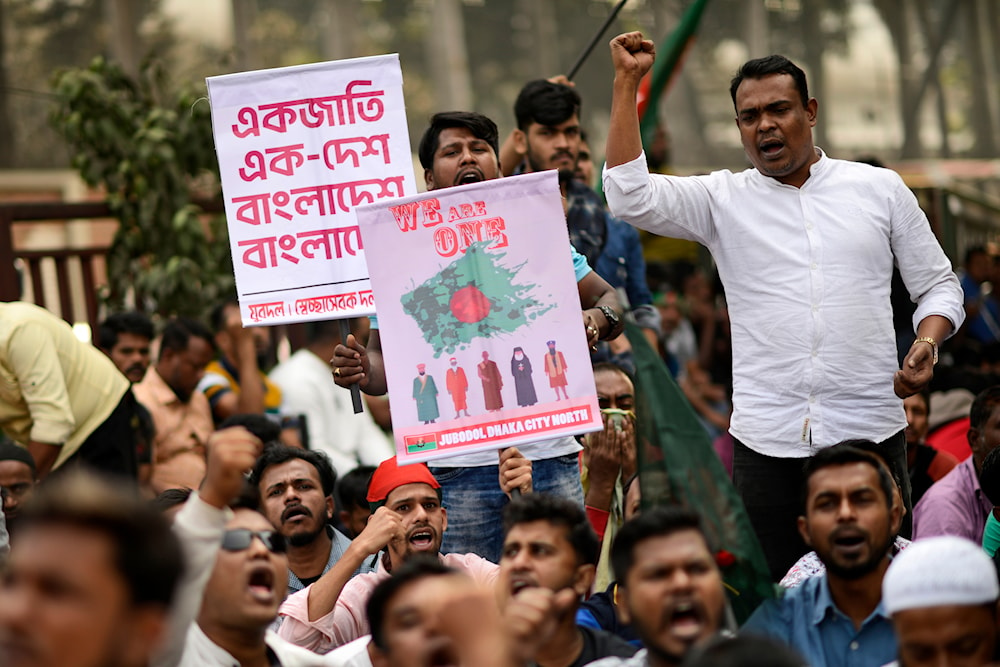UN says former Bangladesh govt behind 'crimes against humanity'
The UN accuses Bangladesh's former government of orchestrating systematic attacks and killings of protesters last year in a bid to cling to power.
-

Supporters of Bangladesh's former Prime Minister Khaleda Zia and her Bangladesh Nationalist Party (BNP) shout slogans during an anti-India protest outside the Indian High Commission in Dhaka, Bangladesh on December 8, 2024. (AP)
The UN has accused Bangladesh's former government of orchestrating systematic attacks and killings against protesters last year to cling to power, warning that these actions could amount to "crimes against humanity."
According to the UN, former Prime Minister Sheikh Hasina’s government was responsible for a violent crackdown, including "hundreds of extrajudicial killings," before being overthrown in a student-led revolution last August.
In its fact-finding report on events in Bangladesh from July 1 to August 15 last year, the UN rights office stated there were "reasonable grounds to believe" that crimes such as murder, torture, imprisonment, and other inhumane acts had occurred.
The report alleges that these crimes, carried out by the government, members of the Awami League party, and Bangladeshi security and intelligence forces, were part of a coordinated effort to suppress protesters and civilians to maintain power.
Hasina, 77, has fled to neighboring India, defying an arrest warrant to face trial in Bangladesh for crimes against humanity.
Up to 1,400 killed
The UN rights office launched its fact-finding mission at the request of Bangladesh's interim leader, Mohammed Yunus, deploying a team of human rights investigators, a forensics physician, and a weapons expert to the country.
Wednesday’s report draws on over 230 confidential interviews with victims, witnesses, protest leaders, rights defenders, and others, conducted both in Bangladesh and online. It also includes reviews of medical files, photos, videos, and other evidence.
The investigation found that Bangladesh’s security forces had actively supported Sheikh Hasina's government during the unrest, which began as protests over civil service job quotas and escalated into broader demands for her resignation. The former government systematically sought to suppress the protests with increasingly violent tactics.
The rights office estimates that up to 1,400 people were killed during the 45-day unrest, with thousands more injured. Most of those killed, including 12 to 13 percent who were children, were shot by Bangladesh's security forces.
'Rampant state violence'
In a statement, UN rights chief Volker Turk said, "The brutal response was a calculated and well-coordinated strategy by the former government to hold onto power in the face of mass opposition."
"There are reasonable grounds to believe hundreds of extrajudicial killings, extensive arbitrary arrests and detentions, and torture, were carried out with the knowledge, coordination, and direction of the political leadership and senior security officials as part of a strategy to suppress the protests."
Turk said the testimonies and evidence gathered by his office "paint a disturbing picture of rampant state violence and targeted killings".
Based on some documented cases, "security forces deliberately killed or maimed defenseless protesters by shooting them at point-blank range," the report said.

 3 Min Read
3 Min Read










